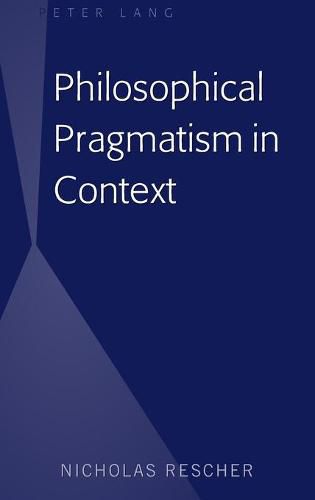Readings Newsletter
Become a Readings Member to make your shopping experience even easier.
Sign in or sign up for free!
You’re not far away from qualifying for FREE standard shipping within Australia
You’ve qualified for FREE standard shipping within Australia
The cart is loading…






This title is printed to order. This book may have been self-published. If so, we cannot guarantee the quality of the content. In the main most books will have gone through the editing process however some may not. We therefore suggest that you be aware of this before ordering this book. If in doubt check either the author or publisher’s details as we are unable to accept any returns unless they are faulty. Please contact us if you have any questions.
Philosophical Pragmatism in Context looks at human affairs and the condition of man from a purposive point of view. From this point of view it is a centrally significant feature of man that we humans are creatures possessing preferences, desires, wants, and-above all-needs. The possession of people’s wants and needs is clearly a factual issue. What my needs are-what I require in order to have a healthy, happy, and rewarding life-is part and parcel of the conditions that define me as the sort of being that I am. Both what people happen to desire and what it is that they require of a healthy, happy, communally productive life-one that engenders satisfaction to themselves and enlists the appropriation (and even admiration) of their fellows-is clearly something factual, something that can be determined by observation. Furthermore, it is something objective-people do not choose what it is that they need; rather, this is something that is determined for them by their mode of emplacement in the world’s scheme of things.
For pragmatism, these requisites pervade the whole domain of human activity, and the issue of whether our modus operandi achieves these goals is pivotal. The pragmatic approach to validation is thus diversified in its efficacy, and it is the aim of this book to expound and illustrate its merits. Both teachers and students of philosophy will find material of interest in the author’s normative and original point of view.
$9.00 standard shipping within Australia
FREE standard shipping within Australia for orders over $100.00
Express & International shipping calculated at checkout
This title is printed to order. This book may have been self-published. If so, we cannot guarantee the quality of the content. In the main most books will have gone through the editing process however some may not. We therefore suggest that you be aware of this before ordering this book. If in doubt check either the author or publisher’s details as we are unable to accept any returns unless they are faulty. Please contact us if you have any questions.
Philosophical Pragmatism in Context looks at human affairs and the condition of man from a purposive point of view. From this point of view it is a centrally significant feature of man that we humans are creatures possessing preferences, desires, wants, and-above all-needs. The possession of people’s wants and needs is clearly a factual issue. What my needs are-what I require in order to have a healthy, happy, and rewarding life-is part and parcel of the conditions that define me as the sort of being that I am. Both what people happen to desire and what it is that they require of a healthy, happy, communally productive life-one that engenders satisfaction to themselves and enlists the appropriation (and even admiration) of their fellows-is clearly something factual, something that can be determined by observation. Furthermore, it is something objective-people do not choose what it is that they need; rather, this is something that is determined for them by their mode of emplacement in the world’s scheme of things.
For pragmatism, these requisites pervade the whole domain of human activity, and the issue of whether our modus operandi achieves these goals is pivotal. The pragmatic approach to validation is thus diversified in its efficacy, and it is the aim of this book to expound and illustrate its merits. Both teachers and students of philosophy will find material of interest in the author’s normative and original point of view.